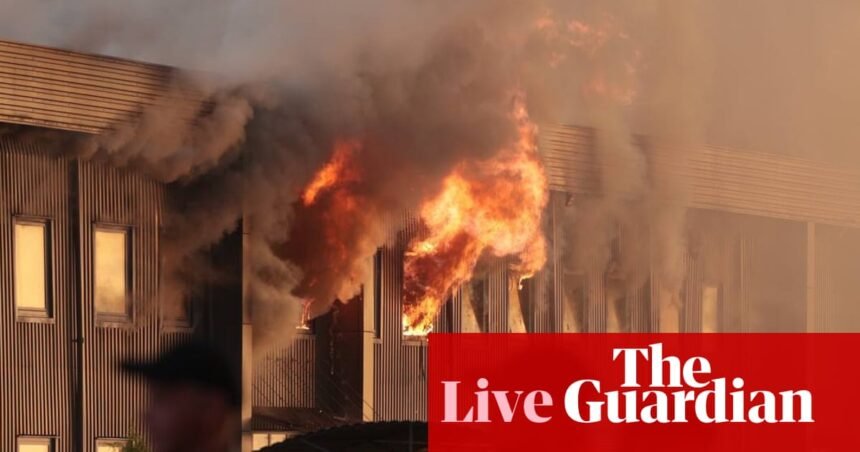Ukraine ready for peace talks anytime, Ukrainian foreign minister says
Ukrainian foreign minister Andrii Sybiha repeated his warnings that Europe needs to face the threat of Russia, and urging the EU to adopt further sanctions against Moscow. He also reiterated that Kyiv was ready for peace talks anytime.
Speaking alongside Polish and Lithuanian ministers in the Polish city of Lublin, he responded to overnight attacks on Ukraine by saying that “having no success on the battlefield, the Kremlin is directing air terror against our peaceful cities and communities, against civilians.” He also referenced the earlier attack at a Polish-owned factory in Ukraine.
Sybiha, formally as an acting minister given the on-going government reshuffle in Kyiv, said that “Moscow seeks to break our spirit, … but it will not succeed, especially for as long as we are together.”
He also repeated calls for the EU to adopt the 18th package of sanctions against Russia, currently blocked by Slovakia, and to put even more pressure on Russia to sit down to ceasefire talks.
Sybiha also criticised Russia’s claims that Ukraine was delaying further peace talks, calling them as “lie, manipulation and distortion of facts,” and stressing that “Ukraine has never been, is not and will not be an obstacle to peace” having agreed to US-led ceasefire proposals.
He said Kyiv remained “ready for such negotiations in any format, in any geography.”
He was backed by Polish and Lithanian counterparts, with Lithuania’s Kęstutis Budrys calling it out as “false narratives and false propaganda coming from Russia.”
“It’s up to Putin to take these conditions, what President Trump is telling him to do already [for] four months and we’re still waiting,” he said.
Key events
On defence and space, von der Leyen confirms plans to spend five times more than in the current budget, with €131bn earmarked for this budget item.
“That is five times of what we have today, because we know that security is a top concern for citizens and governments, and it will strengthen our industrial base and our capabilities,” she explains.
Von der Leyen is also keen to send a clear message on the link between the EU funds and the rule of law, saying:
“In all the MFF [multiannual financial framework] that is being proposed, the respect for the rule of law is unconditional. The rule of law is a must for all funding from the EU budget.
With the next MFF, we go further the national and regional partnership plans will make the rule of law and fundamental rights a condition for investment and a focus for the reforms.”
EU’s von der Leyen presenting EU budget 2028-2034
Von der Leyen is speaking now, too, and she also acknowledges that the presentation was “scheduled earlier,” but “it is a marathon to get there, and we just took more time.”
The political topline is:
It is a budget that matches the EU’s ambition, that confronts Europe’s challenges, and that strengthens our independence.
She talks about “investing in people, member states and regions,” with €865bn for the national and regional partnership plans, “the foundation for investment and reform.”
She says key priorities there will be agriculture and cohesion, again, stressing the commission is “safeguarding €300bn for farmers’ income support.”
She also flags the plan to triple the EU’s investment in migration and border management, “because Europe’s borders are a shared responsibility.”
Jakub Krupa
These numbers will need to be carefully scrutinised to give you a proper assessment of what they mean for the EU.
We will probably hear more of a political spin on it from the commission president Ursula von der Leyen, who is due to speak in a few minutes.
I will bring you the key lines from her.
EU proposes new 2028-2034 budget at €2tn
But EU budget commissioner Serafin is now finally speaking at the European parliament’s budget committee, presenting the proposal to lawmakers before anyone else which he says is “in recognition of your role” as the democratically elected body of the EU.
He admits that the work on the budget continued “until almost three, four o’clock, to be frank.”
He then begins to outline the proposal, saying the European Commission proposes “an ambitious EU budget with a total size of €2tn”.
In what will be read as a warning to Hungary, among others, he pointedly says “the Commission’s position is clear: no EU money without respect for the principle of the rule of law.”
He says the new budget is organised among three core functions: to support member states, to back beneficiaries and businesses through the competitiveness fund, and to support partners globally.
And in recognition of concerns flagged by Jennifer, he says early on that the Commission “will not forget our farmers and fishermen,” ringfencing funds for them.
He also says the EU will confirm it is “serious about Europe’s social model,” with 14% of the budget reserved for social objectives.
Spending on defence and space will be increased five-fold, to €131bn.
On competitiveness, he says €451bn will be dedicated to the competitiveness fund to “bring together our investment efforts across clean tech, digital, biotech, defence, space, and food security.”
Separately, he confirms plans to put aside €100bn for aid for Ukraine.
He says:
“Over the past months, I have had many good conversations with you, and I have listened carefully to what matters most to you.
You have voiced your concerns about the stability of farmers’ incomes, essential for ensuring food security in the EU. You have underlined the importance of predictability for regional funds, which are key for long term investments. You have stressed the need to protect, to protect the European social model, something the EU budget has always supported. And you have made it clear how important the future of European research is …
I hope that you could recognise your contributions in today’s proposal.”
But in the very first response to his presentation, he gets criticised by Romanian lawmaker and economist Siegfried Mureșan for not providing formal documents ahead of the meeting.
“The commitments that were made towards the parliament that we would receive documents … to analyse … unfortunately, [that] was not respected,” he said.
He said the “quality of information” received in the process was “not satisfactory.” Ouch.
EU farmers protest over possible farming cuts in next budget

Jennifer Rankin
in Brussels
In a taste of the angry rows to come about the EU budget, farmers from across Europe have gathered outside European Commission headquarters to protest against possible cuts to farm spending.
Farmers from Ireland, Belgium, France, Italy, Spain, Greece and Poland are among those who have joined a small but noisy demonstration outside the commission’s Berlaymont headquarters.
Inside the Berlaymont, a deadline to reveal proposals for the EU’s next seven-year budget has been and gone.
The EU budget commissioner Piotr Serafin was due to present his plans for the 2028-34 EU budget to MEPs at 12.30 local time. Then it was 2pm. It finally started shortly after 4pm.
MEPs have been left fuming. Siegfried Mureșan, a Romanian centre-right lawmaker, wrote earlier today that MEPs still had not seen any proposal: “Given the importance of this file, this form of inter institutional cooperation is unsatisfactory.”
Ursula von der Leyen is due to unveil the proposals for the budget, known as the multi annual financial framework in EU speak, later on Wednesday, but timing remains in the air.
She is expected to outline proposals for a seven-year budget worth nearly €2tn, according to Bloomberg. But earlier leaked drafts that suggested cuts to farm spending, as well as merging funding streams, such as agriculture and infrastructure spending, into one national fund, has provoked fury from interest groups.
In a speech to demonstrators that summed up the mood, Dutch MEP Jessika Van Leeuwen of the Farmer Citizen Movement, said:
“We are at a crossroads for European agriculture … If we don’t act, it’s too late. We want an independent CAP budget, we need simplification and reduction of CAP bureaucracy.”
Europol, Eurojust break up pro-Russian hacking group in pan-European operation
Meanwhile, EU anti-crime bodies Europol and Eurojust said they had coordinated an international operation to dismantle a pro-Russian hacking group accused of launching thousands of online attacks against Ukraine and its allies, AFP reported.
The network, known as NoName057(16), was disrupted following raids in 12 countries between 14 July and 17, they said.
The operation involved twelve countries and led to the arrest of two people, one in France and one in Spain, they added.
“The actions led to the disruption of an attack-infrastructure consisting of over one hundred computer systems worldwide, while a major part of the group’s central server infrastructure was taken offline,” Europol said in a statement.
AFP noted that authorities issued seven international arrest warrants, including six for suspects based in Russia.
The group carried out 14 attacks in Germany, some lasting several days and affecting around 230 organisations, including arms factories, power suppliers and government agencies, the European agencies said.
Attacks were also carried out across Europe during the European elections. Swedish government and banking websites were hit, while in Switzerland attacks coincided with a June 2023 EU speech by Ukraine’s president and the June 2024 peace summit.
Most recently, the Netherlands was attacked during the Nato summit in late June, the agencies added.
Poland ‘hopeful’ 18th package of EU sanctions on Russia could be adopted soon
Speaking also in Lublin, Polish foreign minister Radosław Sikorski said he was optimistic that the EU could adopt the 18th package of sanctions against Russia soon, despite public opposition from Slovakia who blocked it yesterday.
“When it comes to the sanctions package, these talks are talking place in Brussels literally right now,” he said, suggesting he was hopeful of a good outcome.
Separately, commenting on Russia’s false claims on Ukraine allegedly delaying the peace talks, he pointed out “this war can be over in five minutes, without any negotiations, if Putin orders the Russian army to withdraw to the internationally recognised border.”
Ukraine ready for peace talks anytime, Ukrainian foreign minister says
Ukrainian foreign minister Andrii Sybiha repeated his warnings that Europe needs to face the threat of Russia, and urging the EU to adopt further sanctions against Moscow. He also reiterated that Kyiv was ready for peace talks anytime.
Speaking alongside Polish and Lithuanian ministers in the Polish city of Lublin, he responded to overnight attacks on Ukraine by saying that “having no success on the battlefield, the Kremlin is directing air terror against our peaceful cities and communities, against civilians.” He also referenced the earlier attack at a Polish-owned factory in Ukraine.
Sybiha, formally as an acting minister given the on-going government reshuffle in Kyiv, said that “Moscow seeks to break our spirit, … but it will not succeed, especially for as long as we are together.”
He also repeated calls for the EU to adopt the 18th package of sanctions against Russia, currently blocked by Slovakia, and to put even more pressure on Russia to sit down to ceasefire talks.
Sybiha also criticised Russia’s claims that Ukraine was delaying further peace talks, calling them as “lie, manipulation and distortion of facts,” and stressing that “Ukraine has never been, is not and will not be an obstacle to peace” having agreed to US-led ceasefire proposals.
He said Kyiv remained “ready for such negotiations in any format, in any geography.”
He was backed by Polish and Lithanian counterparts, with Lithuania’s Kęstutis Budrys calling it out as “false narratives and false propaganda coming from Russia.”
“It’s up to Putin to take these conditions, what President Trump is telling him to do already [for] four months and we’re still waiting,” he said.
Ukraine’s PM Shmyhal formally dismissed as part of Zelenskyy’s government reshuffle
The Ukrainian parliament has just formally voted to dismiss prime minister Denys Shmyhal as part of a broader government reshuffle proposed by the country’s president, Volodymyr Zelenskyy, earlier this week.
On Monday, Zelenskyy met with Shmyhal’s deputy Yulia Svyrydenko and asked her to lead the government after the reshuffle. Shmyhal formally submitted his resignation on Tuesday.
Running country is like ‘jumping with a parachute,’ Italy’s Meloni says

Angela Giuffrida
in Rome
Meanwhile, Italy’s prime minister Giorgia Meloni has compared leading the country’s government to “jumping with a parachute every day,” adding that she can’t afford to make mistakes.
She made the comparison after citing the story of Charles Plumb, a US navy pilot in Vietnam whose jet was shot down and he was parachuted into enemy hands. He spent six years in a Vietnamese prison but later thanked the sailor who packed the parachute for saving his life.
“In a world where things are changing so rapidly, the image of a parachute jump is much less metaphorical than one might imagine to describe the situation faced by those who lead a nation,” Meloni said during a ceremony marking new hires to Italy’s secret service.
“Because every day, practically every moment, there are delicate and difficult decisions to be made on issues that are sometimes completely unexplored.”
Meloni said high-stakes decisions “have to be made quickly” and if the parachute isn’t properly prepared and she botches the jump, “there are other Italians who will pay for it”.
Meloni’s rightwing coalition has been in power for almost three years and thus far the three main parties have been fairly cooperative, giving Italians an unusual period of political stability.
Ukraine wing of US-founded terrorist group says it was involved in killing of intelligence officer in Kyiv

Ben Makuch
The Ukrainian wing of an internationally proscribed far-right terrorist organization with suspected links to Russia is claiming involvement in the brazen assassination of an intelligence officer in Kyiv.
Late last week, a masked assailant shot and killed Col Ivan Voronych of the Ukraine security service (SBU) as he walked through a Kyiv parking lot in broad daylight. Shocking footage of the assassination circulated in Ukrainian media and caused a stir among residents in the capital.x
For months, the Base, born in the US and with a web of cells all over the world, has been offering money to supporters or willing participants for targeted assassinations and attacks on the critical infrastructure of Ukraine, coinciding with allegations that its American founder, Rinaldo Nazzaro, was a Kremlin spy.
Ukrainian authorities have also been warning in recent weeks of similar Russian intelligence operations covertly paying unknowing citizens to carry out sabotage inside their country.
“The shooting of the SBU colonel is not the end, but only the beginning,” said a statement posted on a Telegram channel that appears to be linked to the the Base’s supposed Ukrainian cell. “We will continue our struggle until justice prevails.”
The same post, translated from Ukrainian, added that the group’s members were “proud of our associates” who carried out the killing and said they didn’t care if naysayers thought of them as “terrorists and extremists”. In another message to subscribers, the account also threatens other Ukrainian public figures and promises: “The hunt continues!”
Sources in the counter-terrorism field reviewed the posts and said they appeared credible and represented an escalation from the Base, which is now either endorsing treasonous murders inside of Ukraine, actively commissioning them, or both.
EU-US talks turn political as Šefčovič flies to Washington – snap analysis

Lisa O’Carroll
Here’s our snap analysis on the news that European trade commissioner Maroš Šefčovič will fly to Washington this afternoon for separate in-person meetings with commerce secretary Howard Lutnick and US trade representative Jamieson Greer.
The meetings come after Trump blew up an agreement in principle both parties had come to last week.
After starting last week praising the EU for turning from “nasty” to “nice” expectations were high that he would sign off on the three page framework deal.
But on Saturday he announced the 10% tariffs he has currently imposed on EU imports would jump to 30% after 1 August if it didn’t concede more.
The EU had worked on the assumption, that just as UK prime minister Keir Starmer had done, it would be able to concede a Trump-term 10% tariff rate (up from an average of 2.5%) in exchange for relief from punitive tariffs on cars and steel.
Overnight Trump has once again threatened to impose tariffs on pharma imports, warning he would likely introduce a low tariff at the end of the month to encourage US multinationals operating abroad including Ireland to repatriate manufacturing.
Ireland’s finance minister last night reportedly received a “grim” briefing on the future of the economy, factoring in a reduction in foreign investment in future.
Lutnick’s role is to help the president shape tariffs on sectors Trump is threatening to target including pharma, semiconductors and lumber.
Polish-owned company in Ukraine confirms Russian attack left two injured

Jakub Krupa
We also just got an update on the Russian attack on a Polish-owned factory in central Ukraine, first reported by the Polish foreign minister Radosław Sikorski earlier today (10:40).
The factory’s owner, the layered wood floor producer Barlinek Group, told the Guardian in a statement that two people were injured in the attack.
They added:
“At the moment, we do not anticipate that production will resume any earlier than in 6 months. The losses are significant and are still being assessed.
For safety reasons, we have decided not to provide more detailed information.”
The Polish ministry of foreign affairs told Gazeta Wyborcza newspaper that eight people were injured, including two seriously.







